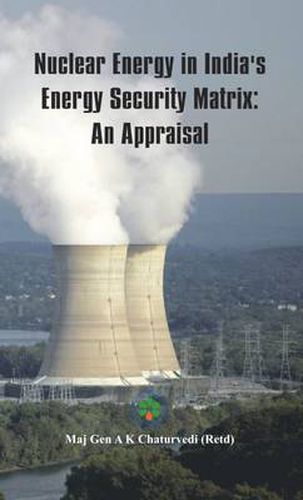Readings Newsletter
Become a Readings Member to make your shopping experience even easier.
Sign in or sign up for free!
You’re not far away from qualifying for FREE standard shipping within Australia
You’ve qualified for FREE standard shipping within Australia
The cart is loading…






This title is printed to order. This book may have been self-published. If so, we cannot guarantee the quality of the content. In the main most books will have gone through the editing process however some may not. We therefore suggest that you be aware of this before ordering this book. If in doubt check either the author or publisher’s details as we are unable to accept any returns unless they are faulty. Please contact us if you have any questions.
Energy is essential for the economic growth of a nation. Its absence or deficiency makes a nation highly vulnerable to international arms twisting as well as internal disturbances. As such, it is an important element in a nation’s security matrix. India which is in the lower half of the countries as far as the energy consumption per capita is concerned. One of major reasons is the gap between the demand and the capacity of the country to supply the energy from indigenous sources. One of the important sources that hold promise in Indian context is the nuclear energy as it is clean and the resource; thorium to produce power through this route is available indigenously. However despite a well developed plan for energy conversion in place, using indigenous resources for over half a century, it is still considered only promising. Relevant questions in this regard are; whether perceived promise is realizable? If so, in what time frame and at what cost? Will it be safe keeping in view its capacity to cause wide spread devastation? Is there a need to seek technical collaboration with other countries or will it be better to go indigenous route only? How do we tackle the widening demand- supply gap during the interim? And finally is there a case for a review for the existing decision loop/energy management system? An attempt has been made in this book to address these issues. It is also expected that the concept advocated in this book for achieving energy security for India by 2030 will initiate a wider debate on the subject.
$9.00 standard shipping within Australia
FREE standard shipping within Australia for orders over $100.00
Express & International shipping calculated at checkout
This title is printed to order. This book may have been self-published. If so, we cannot guarantee the quality of the content. In the main most books will have gone through the editing process however some may not. We therefore suggest that you be aware of this before ordering this book. If in doubt check either the author or publisher’s details as we are unable to accept any returns unless they are faulty. Please contact us if you have any questions.
Energy is essential for the economic growth of a nation. Its absence or deficiency makes a nation highly vulnerable to international arms twisting as well as internal disturbances. As such, it is an important element in a nation’s security matrix. India which is in the lower half of the countries as far as the energy consumption per capita is concerned. One of major reasons is the gap between the demand and the capacity of the country to supply the energy from indigenous sources. One of the important sources that hold promise in Indian context is the nuclear energy as it is clean and the resource; thorium to produce power through this route is available indigenously. However despite a well developed plan for energy conversion in place, using indigenous resources for over half a century, it is still considered only promising. Relevant questions in this regard are; whether perceived promise is realizable? If so, in what time frame and at what cost? Will it be safe keeping in view its capacity to cause wide spread devastation? Is there a need to seek technical collaboration with other countries or will it be better to go indigenous route only? How do we tackle the widening demand- supply gap during the interim? And finally is there a case for a review for the existing decision loop/energy management system? An attempt has been made in this book to address these issues. It is also expected that the concept advocated in this book for achieving energy security for India by 2030 will initiate a wider debate on the subject.